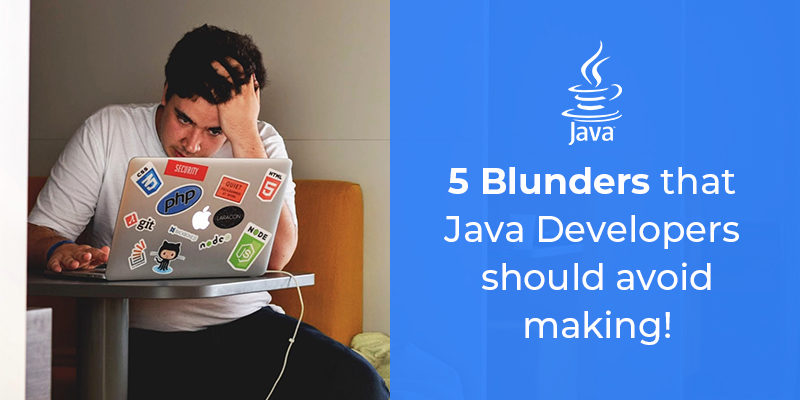
5 Blunders That Java Developers Should Avoid Making
Java is a widely-used programming language that renders a range of applications for diverse needs. Empowered with cross-platform characteristics, the language emerges as a benchmark for client-centric web programming. If you need to invest in Java web application development for your business, hiring a professional developer is the way to go. However, you need to look for an expert because even the experienced developers are prone to making some mistakes with the language. At the same time, you should be aware of the common errors they make so that you can be vigilant about them. Here are some blunders that Java developers should absolutely avoid making.
- Excessive garbage allocation
Essentially, Java applications obtain the objects in memory as required. Garbage Collection (GC) in Java Virtual Machine (JVM) is responsible for automatically determining the memory which is no longer being used by the application and recycling this memory for alternative uses. Developers, therefore, need not be concerned about explicitly freeing up the memory objects not being used because memory is reclaimed automatically in the JVM.
The basis of GC operation is that most of the objects used in the code are meant to be short-lived and can be reclaimed after their creation. When many such short-lived objects are created, it leads to excessive garbage allocation. In such a scenario, the GC works continuously to remove the unneeded objects from memory. In the long run, this may impact application performance to a considerable extent.
- Memory leaks
Though Java uses automatic memory management, developers still need to be vigilant about how the application uses the memory. Memory leaks are a big challenge as they can occur in various ways, the most common reason is with the everlasting object references being the most common reason. This happens because the garbage collector cannot remove the objects from the heap while their references still exist to them.
When the application no longer uses objects but the GC fails to remove them from the working memory as they are still being referenced, memory leaks occur. Consequently, the application consumes more resources, which eventually causes OutOfMemoryError. Developers should pay extra attention to memory leaks because detecting them can be difficult.
- Not freeing up the resources
When you hire Java developer for your project, make sure that they have the right skills and experience to avoid trivial mistakes like not freeing up resources after they are used and no longer required. This should be followed as a rule of thumb for every single file, database connection, and network connection opened by them.
They should also be cautious for any exception that was to be thrown during the operations on these resources. This error can result in the resources being leaked or memory being occupied by objects that are no longer in use. This particular mistake can be avoided by using the try-with-resources structure on resources for implementing the AutoCloseable interface.
- Access to non-static members from static methods
In Java programming, a static method is the one which belongs to a class rather than to an instance of that class. The method can, therefore, be called without the object or instance of that class. Conversely, a non-static method can access a static method and static variable, without making the use of the object of the class.
Java developers, particularly the ones who are new to the domain, may fail to distinguish between the two. This mistake can be avoided by ensuring that the methods and variables are accessed via object reference. Additionally, developers must understand that it would be wrong to access them from a static context.
- Neglecting existing libraries
As a programming language, Java is acclaimed for offering libraries for all kinds of work. These libraries are very useful for developers but many of them make the mistake of neglecting the existing ones that are available with the language.
The best approach would be searching for the available ones before trying to reinvent the wheel. These include the logging libraries such as Log4j and log back or network-related libraries such as Akka and Netty. These libraries have been used for years now and have evolved to become better over time.
Conclusion
Even though these blunders are common, they can cause glitches in your Java application. Therefore, you must make sure that the developers you choose are experienced enough to avoid them under all circumstances. The best approach would be to collaborate with a reputed Java development company for hiring professionals who are seasoned enough to handle your project successfully.
Java India is a domain expert you can trust for creating enterprise-grade applications that empower businesses. We have a team of skilled Java developers who have years of experience in creating diverse applications for a global clientage. Share your requirements with us and we will connect you with the best resources who assure the highest quality of services for your project.

